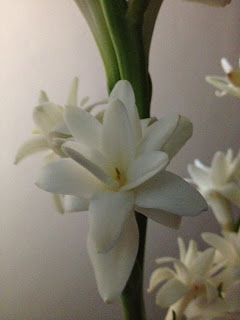I have been getting some interesting questions regarding how
Ugandans celebrate Christmas. I get asked “do they celebrate Kwanzaa?” “Is it a
more African Christmas?” to which I just respond “no and no”. I can’t say I’m
shocked at how Christmas is celebrated over here. It just seems so much like
home – but hot like it’s summer time. Everyday seems to get a little hotter and
I sweat more and more. I’m wearing more dresses and shorts due to the extreme
heat and find myself getting dehydrated more often because of this as well. But
when I go to Oasis or Garden City (malls), I see all the decorations hanging and
holiday music playing. To be honest, that’s the only time I feel like it’s Christmas
time. Then I walk outside and recall that I’m in Africa.
I do want to address the Kwanzaa question. Many people assume
that Kwanza is an African tradition or celebration but it’s actually an African
American celebration. Perhaps because ‘kwanza’ is a Swahili word for ‘first’,
people assume that it’s an East African tradition. And perhaps people are used
to seeing the Kente cloth around this time of year, but again, that’s an African
American thing. The purpose of kwanza was to unite the African American
community. It’s really a young
celebration when you compare it to other holidays around this time of year.
After a little bit of research on what Kwanza was all about, I decided that I should
give it a try this year. Sometimes, African Americans come to Africa to
discover their roots, I’m not one of those. I came to learn about the culture
and government structure as a result of colonialism. But, I am learning a lot
about myself and I have learned that my culture is quite unique. And Kwanzaa
interest me because it is directly related to my heritage. It isn’t meant to
replace a spiritual holiday such as Christmas or Hanukkah, but to unify a
community by practicing 7 principles for 7 days (Dec 26 - Jan 1):
- Umoja (Unity): To
strive for and to maintain unity in the family, community, nation, and
race.
- Kujichagulia (Self-Determination): To define ourselves, name ourselves, create for
ourselves, and speak for ourselves stand up.
- Ujima (Collective
Work and Responsibility): To build and maintain our community together and
make our brothers' and sisters' problems our problems, and to solve them
together.
- Ujamaa(Cooperative Economics): To build and maintain our own stores, shops, and
other businesses and to profit from them together.
- Nia (Purpose):
To make our collective vocation the building and developing of our
community in order to restore our people to their traditional greatness.
- Kuumba (Creativity): To do always as much as we can, in the way we can, in
order to leave our community more beautiful and beneficial than we
inherited it.
- Imani (Faith): To
believe with all our hearts in God, our people, our parents, our teachers,
our leaders, and the righteousness and victory of our struggle.
I find all of this to be very interesting, and being that I’ve
dedicated this year to learning about different cultures, why not dive into my
own unique culture and try Kwanzaa for the first time this year. I know there
has been a bit of a backlash to Kwanzaa for some time in the African American
community, but I’m going to choose to do this for my own learning experiences. I would also like to note that all of the
gifts that are given during Kwanzaa are handmade. I think that adds a great
personal touch to the tradition and meaning of Kwanzaa, if you ask me. These
are all principles that I think every person, no matter their race or
nationality, can learn from.
This is a big deal to me personally because I grew up in a predominately
white area. I was oftentimes the only black female in my classes, so many
people made comments to me about being African American and looking African (most
of the time not very nice comments). I admit,
I was ashamed of who I was any my ancestors. But, as time passed and I matured,
I realized that I have nothing to be ashamed about. What happened to my
ancestors wasn’t their fault and it’s in the past now. All I can do is make
sure that what they fought for lives on and I pass it down to my children.
Since coming to East Africa, I have been questioned repeatedly about my
heritage and now I say with pride that I’m African American because it’s unique
but more importantly, it makes up who I am inside and outside. But my past
doesn’t define my future, it’s my actions that define my future. I hope that this holiday season, I learn something
from my first celebration of Kwanza and that I can teach everyone reading this
something too.
 If you’re interested in learning more about Kwanzaa, check
out the documentary “The Black Candle” or read this interesting article.
If you’re interested in learning more about Kwanzaa, check
out the documentary “The Black Candle” or read this interesting article.































